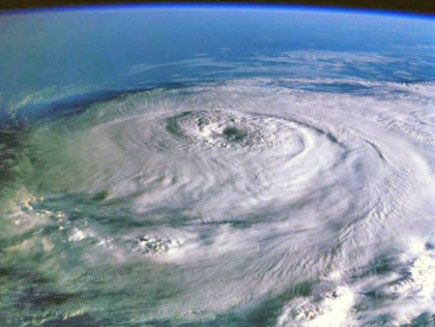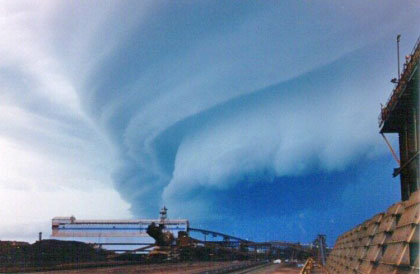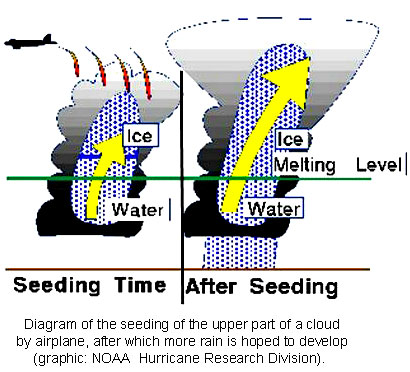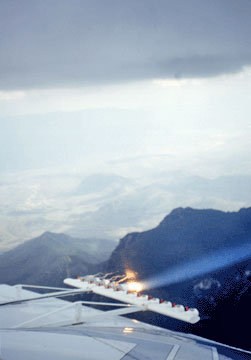|


by Steve Watson & Paul Joseph Watson
14 Oct 2005
from
PrisonPlanet Website

Alex Jones was joined on air yesterday by weather modification
expert
Ben Livingston.
Livingston discussed in detail proven evidence of hurricane control
and his research and experiences with cloud seeding and weather
weapons used in the Vietnam war.
Many scoff at the possibility of weather control and simply refuse
to believe it exists. Attempting to even engage such people in
conversation on the subject is fruitless because their mind is set.
Yet the reality is that weather modification has been in operation
and continual development since the 1960s.
Livingston, now 77, has a master's degree in cloud physics from the
Naval Weapons Center and Navy Post Graduate School in California, a
degree he later used in the battlefields.
According to a recent report,
"He seeded clouds and dramatically
increased rainfall in his theater of war, creating impassably muddy
roads, slowing down the Vietnamese and Korean troops, and saving
lives and entire towns from occupation."
Livingston was even invited to the White House where he briefed
President Lyndon B. Johnson on the effectiveness of weather control
activities. Livingston asserts that hurricane control was a national
priority of the government in the 60s and they had the ability to do
it at that time. That was 40 years ago.
He now works with scientists and pilots at
Weather Modification
Inc., in Fargo, N.D. His research of hurricane control has been
confirmed by the Stanford Research Institute.
He has personally flown on 265 missions into the eyes of hurricanes
and has gone on record as "most disgusted" with Hurricane Katrina
because he knows that the storm itself could have been minimized.
Livingston revealed that to reduce or redirect a category 4
hurricane would not be that difficult:
"A hurricane is made up of energy sails and each of those sails adds
to the ferocity of it. It was proven in 1974 by an international
project that these energy sails exist and that they are the reason
that hurricanes can develop and grow move and cause damages. So
there's no reason to attack the hurricane in total but just to fly
in to the right front quadrant primarily relative to the direction
the storm is moving in and seed those energy sails that are
converging and making the rain and wind velocity increase in the
front part of a hurricane." Livingston asserted.
He went on to explain exactly how to minimize and control the
hurricane:
" We would be trying to destroy or at least grossly reduce the
velocity in these individual energy sails by seeding the clouds with
silver iodide in the top part of the cloud... and those tops would
then have so many small droplets in them that the prevailing wind
just blows them away and so an energy sail would be neutralized
until it can regroup which may be several hours later."

The seeding process may sound complicated but it is not at all.
There would be no need for more than two small aircraft at a time to
safely fly upwards into the hurricane.
"We're carrying more cloud seeding material on one airplane now,
over 800% more on each plane than we had during
Project Storm Fury"
(The project set up by the US Government to discover how to control
hurricanes in the 60s). Livingston added.
Alex put the question to Livingston, if it is so simple to do and
the government knows how to do it and has been doing it since the
60s then why did they not attempt to minimize hurricane Katrina?
"This is a long story with a deep history. Back in the mid 50s, 1954
or so, the government allotted the first amount of money for weather
modification and weather control practices to the US weather Bureau
to the tune of about 30 million dollars." Livingston said.
"Their charge was to employ the most brilliant scientists around the
world, and meteorologists and physicists, to work out a concept for
reducing damages from hurricanes. What brought that on was that we
had three tremendous hurricanes in 1953 and '54 that affected the
twelve northeastern states... Basically The National Oceanic
Atmospheric Administration (NOAA) was formed to take that
responsibility." He went on to say.
Mr Livingston went on to describe how
Project "Storm Fury" of which
he was a national director was then set up in the mid 60s. Much of
the research was carried out on hurricanes in the Atlantic at that
time.
Project Storm Fury was shut down on the logic that the data was not
good enough to use in statistical studies. Many believe that the
research then became part of a black operation on weather
modification.
Upon recently writing to verify what the national policy is on
hurricane research, Livingston received the following response:
"The approach of NOAA with regard to minimizing the impact of
hurricanes on US citizens is to improve our forecast on the tracking
and intensity of storms and to better warn those in harm's way. It
is no longer the policy of NOAA to support or conduct weather
modification research."
So there is effectively no official government budget for weather
modification of any kind. This would not however prevent the hiring
of private companies such as Weather Modification, Inc. to carry out
the relatively simple work for around $25 million for the hurricane
season. This is a small amount when considering the billions spent
on rebuilding and clearing up after hurricanes.
"The situation is as I see it that the
Federal Government and NOAA
have a tremendous job to do and they're doing a tremendous job. But
their interest is in statistical data... where as people who are
concerned about hurricane damages are interested more in results or
empirical data." Livingston added.
Dr Livingston went on to read a statement from the
Stanford research
Institute who were brought into Project Storm Fury in the late
sixties as a third party, which stated conclusively that knowledge
of how to stop hurricanes had been uncovered and that they would be
directly liable should a hurricane hit and cause extensive damage
and loss of life.
Livingston revealed that on the 18th August 1969, five seedings at
two hour intervals on Hurricane Debbie, researchers deduced that the
wind speed had decreased from 115mph to 80 mph. That is a 30%
reduction and a 45% reduction in damages. On August 20th a second
seeding decreased the wind speed again to just under 100 mph, a
reduction of around 15%. Some scientists involved wanted more
research and to uncover clearer patterns so they brought in Stanford
as a third party, who determined that more seeding should be done
for damage reduction.
Of course, during the Vietnam war the goal for Livingston and his
colleagues was to actually strengthen adverse weather, to inflate
and exacerbate the monsoon season in order that the Vietnamese get
bogged down. So not only is prevention possible, but also creation
of harsh weather conditions.
Dr Livingston was assigned in 1966 from the Naval weapons research
Laboratory to a marine fighter squadron in Vietnam. Instead of guns,
the aircraft under Livingston's control were fitted with cloud
seeding equipment.
"My mission was to find clouds and seed them for maximum
precipitation value" he commented.

Cloud seeding is the process of spreading either dry ice (or more
commonly, silver iodide aerosols) into the upper part of clouds to
try to stimulate the precipitation process and form rain. Since most
rainfall starts through the growth of ice crystals from super-cooled
cloud droplets (droplets colder than the freezing point, 32 deg. F)
in the upper parts of clouds, the silver iodide particles are meant
to encourage the growth of new ice particles.
Check Out this
local Government web page on Weather Modification.
It's Amazing how people still believe that this science does not
exist!

Airborne hygroscopic flares emit water-attracting particles
into
cloud updrafts during a recent cloud-seeding project in Mexico.
Alex went on to ask Dr Livingston whether it was dangerous flying
into hurricanes, and whether that was a factor that could have
prevented operations going ahead.
"A good part of the time you're out in the most beautiful
VFR
weather you've ever seen. If it's night you can see the stars, the
moon, if it's daytime the sun or whatever. So you can not only see
what you're going to seed, you can analyze it on your radar...
generally speaking its not very hazardous flying." Livingston
answered.
Dr Livingston puts beyond doubt the reality of weather modification.
His take on Hurricane Katrina is that it was not prevented for
political reasons.
|




